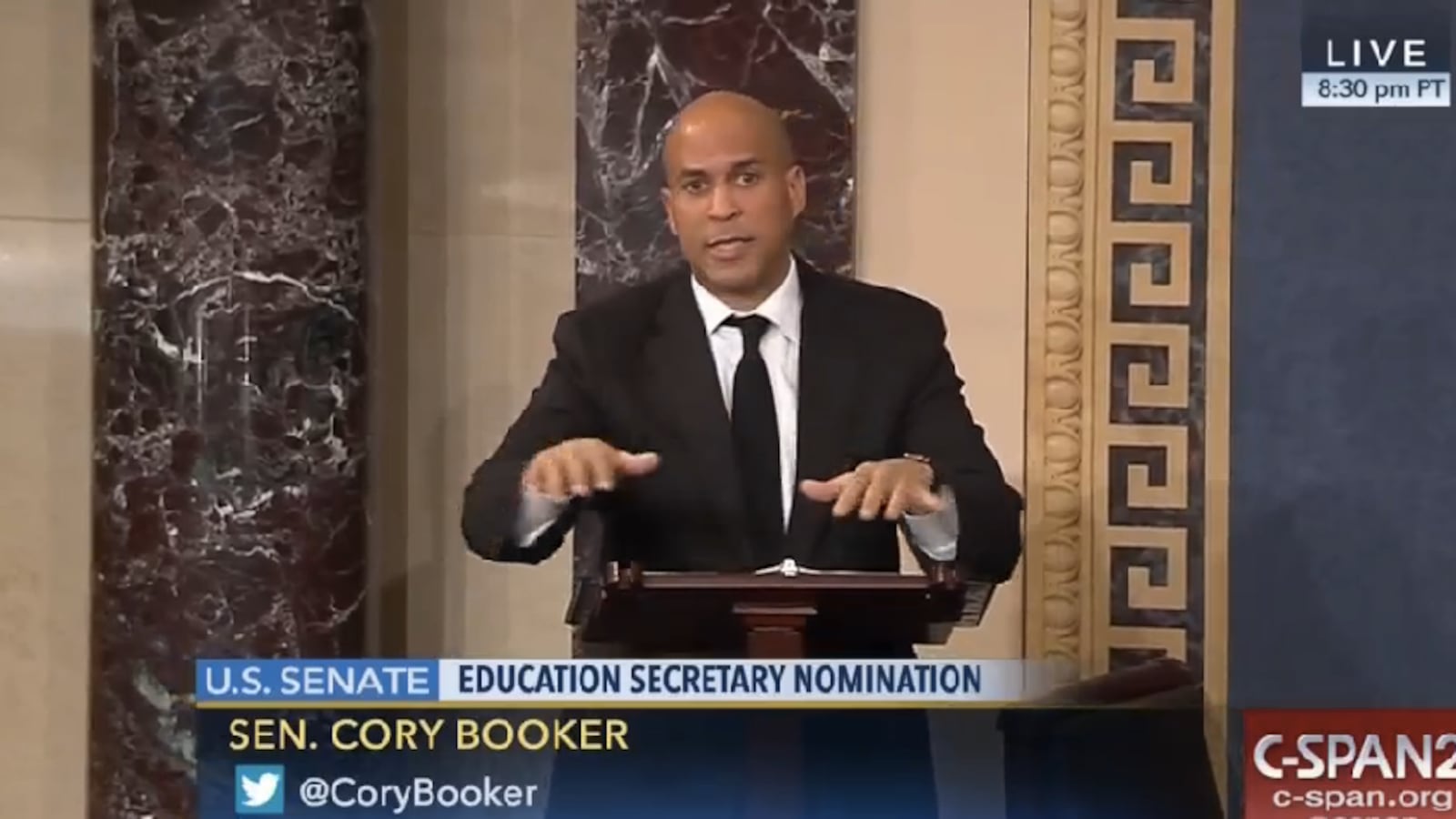President Donald Trump hasn’t yet changed the policy of education in America. But two speeches by the same man — one last night and one in May — show how his election is changing the politics.
In one, speaking late last night on the Senate floor, Cory Booker, a Democrat senator from New Jersey, made an emotional case for why he will not support Betsy DeVos’s nomination as secretary of education. His opposition centered around a concern that DeVos would not protect students’ civil rights.
Booker, the former mayor of Newark, invoked the story of Ruby Bridges, who desegregated an all-white public school in New Orleans. “I feel I owe her a duty … not to vote on someone who has been silent on the issues that are so critical to this country being who we say we are,” he said.
Part of Booker’s remarks:
In the other speech, which Booker delivered last May, Booker praised DeVos’s nonprofit education advocacy organization as a champion of civil rights. By promoting school choice through charter schools and vouchers, the organization was helping to carry out the next and “final” phase of the civil rights movement, Booker said.
He made the speech at the annual gathering for the organization DeVos founded in 2010 and led until shortly after her nomination, the American Federation for Children. “The mission of this organization is aligned with the mission of our nation,” he said.
Here are those remarks:
Booker’s turnaround on DeVos reflects changes afoot in the politics of education. His speech last night on the Senate floor might have been typical in the 1980s or 1990s: A Democrat opposing a Republican’s education position on the grounds that it does not support the civil rights of vulnerable populations.
But in the last 25 years, a group of Democrats and Republicans came together around an education agenda that was both explicitly pro-civil rights — traditionally Democratic terrain — and explicitly pro-market-style reform, like charter schools and, for some, vouchers — traditionally Republican terrain.
In his career, Booker has been a more extreme example of Democrats embracing issues that are traditionally third rails for their party. He not only actively supports charter schools, whose growth teachers unions oppose, but has been an enthusiastic proponent of publicly funded private school vouchers. That’s why he was able to say, in his remarks at the American Federation for Children event, that he has been involved with the group for 10 years. Booker’s argument, like that of other Democrats who support vouchers, is that poor children and children of color need escape valves from struggling public schools.
Booker isn’t alone. Kevin Chavous, an education activist, helped to found a group called Democrats for Education Reform, which rose to encourage Democrats to support school choice and other education policies they have traditionally opposed. Chavous also spoke at DeVos’s organization’s event in May and serves as a board member for the organization. But today, Democrats for Education Reform has come out aggressively opposing DeVos.
Booker did not mention vouchers or charter schools, but instead focused on concerns about the education department’s Office of Civil Rights, which he said he fears will be diluted under DeVos. The omission points to an important point: Behind the change in the education coalition is a shift in politics, not education policy positions. In the wake of Trump’s election, other issues — including Trump’s stance on immigration, LGBTQ communities, and women’s issues — are driving a wedge between Democrats and Republicans who previously could find common ground on education issues.
Writing on Facebook last night, Derrell Bradford, an education activist who supports school vouchers, noted the shift in Booker’s remarks. “It’s pretty safe to say that, regardless of the outcome, tomorrow there won’t be an ed reform ‘left’ as we know it anymore,” Bradford wrote. “Maybe a good thing. Maybe a bad thing. Either way, it’s a thing.”


